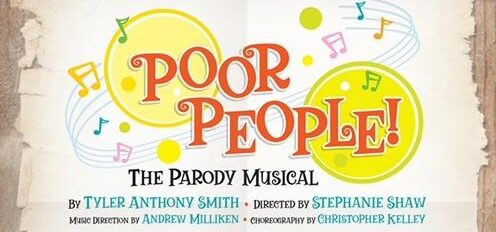
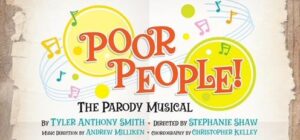 **** “Poor People” is a cleverly-inspired parody by Hell in a Handbag Productions that consists of a mashup of stories, songs, and characters taken from major Broadway musicals from the second half of the 20th century. The basic thrust is that while the destitute are often scapegoated and treated badly, here the characters have their revenge! Although this world premiere production features people who live in poverty, there are nevertheless several add-ons to the story taken from other Broadway hits, that is, whenever a character must fill a major role or a catchy song is desired. I really loved the idea behind this show, and it was a fun romp down memory lane, as I experienced the various changes, elaborations, and modifications to familiar scripts. The layering of one storyline over another makes the contrasts between the narratives and the characters stand out, thus revealing the humor inherent in bizarre and often unrealistic situations. I especially enjoyed hearing the transformed lyrics while trying to refresh my memory about the original songs and the musical productions that they came from.
**** “Poor People” is a cleverly-inspired parody by Hell in a Handbag Productions that consists of a mashup of stories, songs, and characters taken from major Broadway musicals from the second half of the 20th century. The basic thrust is that while the destitute are often scapegoated and treated badly, here the characters have their revenge! Although this world premiere production features people who live in poverty, there are nevertheless several add-ons to the story taken from other Broadway hits, that is, whenever a character must fill a major role or a catchy song is desired. I really loved the idea behind this show, and it was a fun romp down memory lane, as I experienced the various changes, elaborations, and modifications to familiar scripts. The layering of one storyline over another makes the contrasts between the narratives and the characters stand out, thus revealing the humor inherent in bizarre and often unrealistic situations. I especially enjoyed hearing the transformed lyrics while trying to refresh my memory about the original songs and the musical productions that they came from.
The year is 1979. The show begins with a young character named Arnie (Dakota Hughes), who is a spoof on Li’l Orphan Annie from the famous musical. Totally miserable , Arnie seeks to escape from their guardian, the notorious Miss A. or Miss Afghanistan (Sydney Genco), who runs the New York City Orphanage. Just like Alice descending a rabbit hole into Wonderland, Arnie follows a cat named Fosse Kitty (Matty Bettencourt) and travels down a Manhattan manhole—only to go back in time to face poverty in a different era. Once Arnie ascends from the Paris sewers, Arnie learns it is the year 1815, and now has to become a part of the cast from “Les Miserables.” The amalgamation of “Phantom of the Opera”, “Cats”, “Chicago”, “My Fair Lady”, “Oliver!”, “Sweeney Todd”, and so on and so forth is uniquely and hysterically funny. Then too, so is the use of the “F-word”, the numerous and sundry sexual references, and the coarseness of language throughout. The names of characters are altered with finesse too! The show is additionally a spoof about what it means to be a theatregoer. It constantly breaks down the 4th wall, especially in its message at the end of the first act about what the audience is about to see next and what the intermission is all about.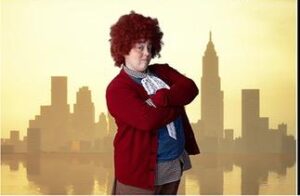
Other characters include Fagin (pronounced Fag-in), played by artistic director David Cerda; Pantene (Caitlin Jackson); Beggar Woman who is also a witch (Elizabeth Lesinski); the good-natured prostitute Nance (Tyler Anthony Smith); Mama Moneybags, the unabashed Republican from the year 2024 (Brittney Brown); Epipen (Taylor Dalton); Twinky, (Patrick O’Keefe who does a great British accent); The Groomer of the Flop’ra, i.e., Erik from Phantom of the Opera, (Shane Roberie); and Pretty Rich Boy (Tommy Thurston).
As much as I enjoyed the concept and most of the comedy bits, I felt that the script could be improved upon. To my mind, playwright Tyler Anthony Smith didn’t know exactly how or where to end this brilliantly conceived story, and herein hangs a tale. I preferred the light and ridiculous humor that makes up much of the first act, as compared to the dark and off-the-wall humor that makes up much of the second. Plus the references to “Jesus Christ Superstar” are too blasphemous for my taste. For me, this portion has nothing to do with the musical, and I don’t find it funny. I’m not a fan of ridiculing other people’s religious beliefs; however, I’m sure a number of people in the audience will find this segment to be perfectly acceptable. Also, while having three villains from three different musicals come together is a clever touch, the result of their interaction doesn’t make the play as much fun anymore, especially when the use of a toy helicopter from “Miss Saigon” is much too childish. Furthermore, the stuff about the Epipen gets to be insipid, and there are also a few too many uses of squirrel rats as a parody of the pigeons taken from “Mary Poppins.”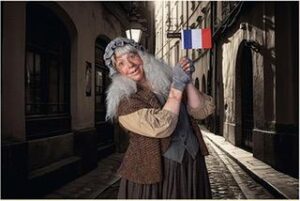
Yet the biggest fault with this production is that the stage is too small for such a large and active cast, especially when they are all singing and dancing and playing with props. While the direction by Stephanie Shaw is marvelous and the audience could see everything on stage from their seats in a U-shaped formation, the first row on all three sides is much too close to the action. My guest and I happened to be seated in the first row, and the person two seats to my right was unintentionally touched more than once by an actor who was grabbing at one of the upright theatre supports. (You should have seen the expression on the patron’s face when this happened!) I too was touched on my leg by a rogue squirrel-rat and took it with a laugh.
Music direction by Andrew Milliken could not have been any better; his keyboard performance cannot be excelled! Choreography by Christopher Kelley is just perfect, although, as mentioned a moment ago, to get the full effect of the dance numbers, there ought to be a much bigger stage. Kudos to G. “Max” Maxin IV, who did all of the scenic, lighting, and projection design. Sound design by Miranda Coble is great, as is props design by Maggie O’Brien. Thanks to the gorgeous work by Rachel M. Sypniewski, the costumes are ideal in keeping with the eras of each of the original Broadway shows. Plus wig design by Keith Ryan and make-up design by Syd Genco add to the total effect. Finally, the creation of a pet cat by Jabberwocky Marionettes is skillfully done.
Though I loved reminiscing about songs which I was already familiar with and seeing the creativity involved in how the scripts and the song lyrics were modified, the performance is a bit too long and drawn out as a whole; and it starts to get too repetitive as time goes on. It does not need to be a full 2 hours plus a 15-minute intermission in order to make all its points. Then again, there really aren’t any points to make. That is because “Poor People” is not supposed to be a deep analysis of the human condition; rather, it’s a form of easygoing amusement.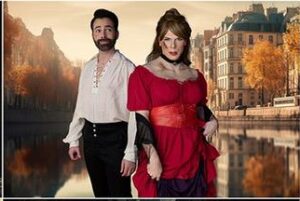
In fact, this ribald comedy is reminiscent of the burlesque shows of the 19th and early 20th centuries. Burlesque in that era was meant to be ridiculous: Through the use of absurdity, it was imitative of the styles of known artists, authors, and playwrights. There was a presupposition that the material which the show is based on is something that the audience already knows about. This way, the spoof would have its intended effect of poking fun at all the right targets: usually having to do with famous people, established characters or stereotypes, or previously well-known situations. Now bringing this idea home into the present-day, the more that we can recall the various references from Broadway musicals, the funnier today’s performance is. The bottom line is that if you want to have a good laugh, then this is a great show to see!
“Poor People! The Parody Musical” is playing through June 16, 2024, at The Chopin Studio Theatre, 1543 W. Division St. in Chicago.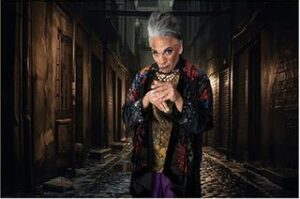
General admission tickets: $42
VIP/reserved seating – $60
Group rates – $36 each for 10 or more.
 Performance schedule:
Performance schedule:
Thursdays, Fridays and Saturdays at 8:00 p.m.
Sundays at 4:00 pm.
Industry Night: Wednesday, June 12 at 8:00 p.m.
For more information about the show, see: https://www.handbagproductions.org/now-playing.html.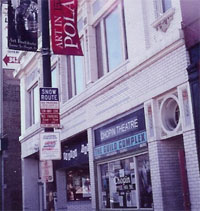
To purchase tickets, visit: https://www.tickettailor.com/events/hellinahandbagproductions/1116848.
For general information and to find out about their other offerings, go to: https://www.handbagproductions.org/.
To see what others are saying, visit www.theatreinchicago.com, go to Review Round-Up and click at “Poor People! The Parody Musical”.






More Stories
“The Firebugs” reviewed by Julia W. Rath
“The Book of Grace” Al Bresloff with another from Paul LIsnek
“The Last Five Years” MILWAUKEE